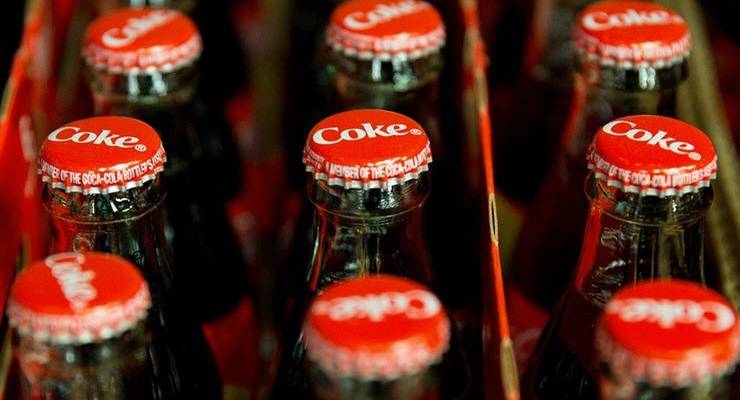
Below the hubbub of enthusiasm about the new economy, an old economy juggernaut is quietly still killing it.
Coca-Cola’s quarterly earnings release this week shows that the company saw its profits rise 6% in the second quarter of 2019, and its stock price rise to a record high. Not bad for an old-fashioned sugar water concern. The company was valued at $299 billion after trade on Thursday.

How has the Coca-Cola Company managed to shake off the doubters that imperilled it?
Functional beverages
What it has done, more than anything else, is diversify. The process goes back a long way. It began in 1940 when, due to war shortages, a company representative in Germany created Fanta. After that, Coca-Cola added Sprite and in the 1960s bought the juice company Minute Maid.
Diversification intensified as time went on. The company invented Powerade and began selling bottled water. But now diversification is at the heart of what Coca-Cola does. Whatever kind of drink you want, whatever kind of drink you can imagine, Coca-Cola makes and markets it.
In fact, sparkling soft drinks now make up a minority of its revenues in its largest and most mature market, North America. A refrigerated, flavoured soy-milk drink called AdeS is now a large and growing part of its European offering, and a mango drink called Maaza sold in India is now important enough to its global business to warrant a mention in the consolidated revenue statement.
Drinks aren’t just for thirst now; they have to do something. In a way, it makes sense Coca-Cola is so heavily into “functional beverages”. Coke’s first ever ad enthused the product it sold from soda fountains in drug stores was “Exhilarating! Invigorating!”
Sports hydration is a great example of a functional beverage category, promising enhanced athletic performance. But functionality has gone down many unexpected paths. For example, Coke recently introduced a fibre drink, which is on sale in Japan and contains five grams of dextrin per serve. The company also recently bought an Australian kombucha company, Mojo.
“With this acquisition, Coca-Cola Australia can take a leading role in helping The Coca-Cola Company in the still-emerging, premium-probiotic kombucha category, which is the fastest-growing beverage category in Australia,” said Vamsi Mohan Thati, Coca-Cola Australia’s President.
The caffeine question
Arguably, cola drinks sell so well because they contain caffeine, and caffeine drinks sell so well — in part — because they are addictive. In Australia Mountain Dew came to contain caffeine only recently, but in the US — where it has long been caffeinated — it is the number four beverage nationwide, behind Coke, Pepsi and Diet Coke.
Coca-Cola sells a range of energy drinks including Coca-Cola Energy — essentially a Coke version of Red Bull, which launched in Australia earlier this year. But energy drinks don’t sell too widely among adults. Coffee is the most socially acceptable way for adults to get their hit of caffeine, and so Coca-Cola bought the Costa Coffee Group in early 2019 for US$4.9 billion.
Costa is a cafe chain with a presence in more than 30 countries. Coca-Cola is also going to use the Costa brand to launch canned coffee, hoping their refrigerator-centric business can get a slice of the coffee market.
In the big leagues
After all these acquisitions and diversifications, Coca-Cola resembles less a single company and more and more the giant conglomerates that dominate the alcoholic beverage market — names like Asahi and Anheuser-Busch InBev. (In July this year AB InBev sold Australian brand Carlton & United Breweries to Asahi for $16 billion.)
CEO James Quincey describes Coca-Cola as “a total beverage company” and that seems — for now — to be working for it. Future success depends less on the appeal of a single beverage, and Coca-Cola may, if it keeps up its current broadening, even be able to weather the social backlash against sugar consumption.








Why do many people drink these gassy liquids, sugared and flavoured, at all, at high prices over time? I’ve not had Coke or similar for several decades, subsisting on milk, coffee, tea, beer, wine, the odd spirit. Are they all habitual or addictive? Coke and similar drinks remain irrelevant and a waste, but that’s only a personal view. They are a part of lifestyles, heavily promoted, corporate gems.
Having heard it so often, I’ve often wondered, “What is a ‘new record high’?”
What a shame. I had hoped that this company wold disappear and take its diabetes inducing products with it. It remains a symbol of all that is bad about economic colonialism. Sugar, fizz and death.
People seem to enjoy chemical piss like coke. Relentlessly advertise and promote real piss with a drug in it and it would sell. Oh, that’s right hey do, it’s called beer.